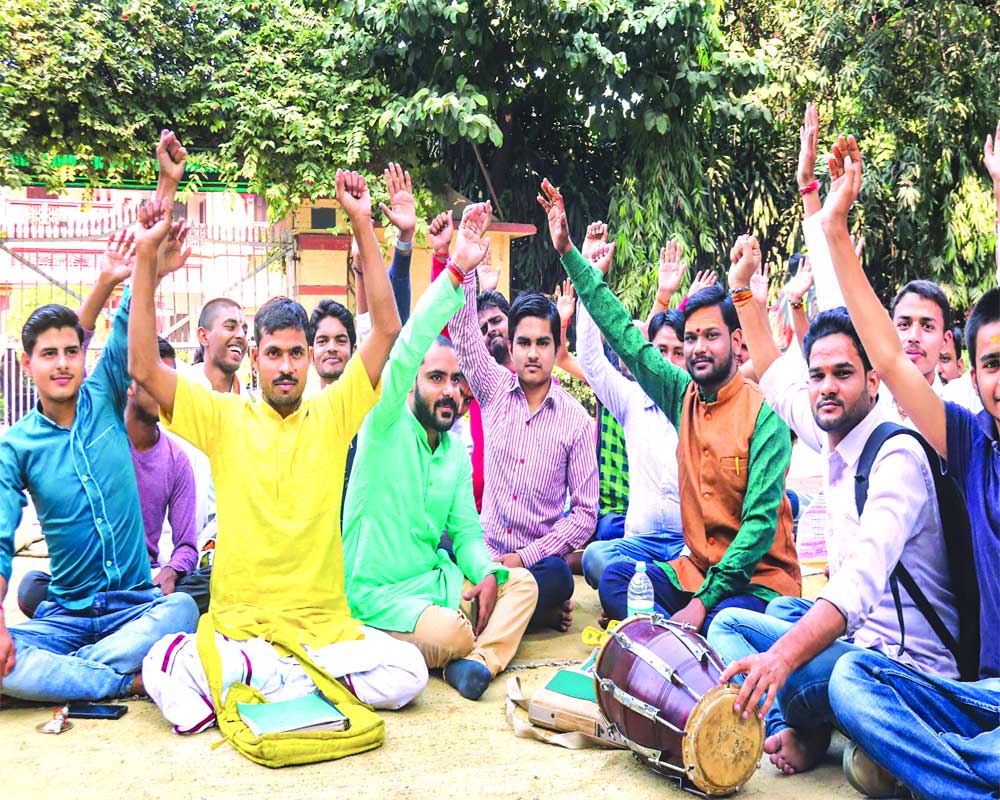Going by the concerns raised by stakeholders, it seems the BHU administration took an uninformed decision in charting out a unique path by appointing a Muslim to SVDV job that entails performing rituals
India is not new to language wars. In fact, the anti-Hindi crusade has been a cornerstone of the dominant regional political discourse in the south. However, in recent history, there is no instance of political and ethnic conflicts over the ownership of a language that is no longer a lingua franca. Seen in this context, the outrage at the selection of a “Muslim” scholar of Sanskrit to teach at a Sanskrit department in Banaras Hindu University (BHU) warrants an objective analysis, primarily for two reasons: First, such protests are without precedent in the Ganga-Jamuni tehzeeb of the region; second, the articulation of the arguments in favour and against the appointment.
At the outset, it is pertinent to explain the strange turn of events at BHU to clear up misunderstandings. Firoz Khan, a doctorate in Sanskrit, is the first Muslim to be appointed in the faculty of Sanskrit Vidya Dharma Vijgyan Sankay (SVDV) — a starkly different faculty than the Sanskrit Department under the Faculty of Arts — of BHU. The November 6 appointment was protested by SVDV students who boycotted classes claiming that a Muslim can’t teach them their “dharma”.
However, caught up in the rat race of dishing out information, albeit half-baked, at the earliest, the social media was replete with acerbic comments, mostly against the protesting students. The liberal brigade ridiculed the agitated students terming their protests as an assault on the secular fabric of India and infringement of the rights and liberty of any person to learn/teach any language. Their indignation stemmed from the generally accepted fact that a language is the not absolute fiefdom of a particular religion.
Fortunately, despite “secular” political leaders’ vehement protestation of fighting for the rights of the minority, the Muslim community didn’t swallow the bait. At the most, it drew well-meaning reactions from some of the Muslim scholars of Sanskrit who recounted their happy academic journey both as students and teachers, feeling no discrimination: Passing the Sanskrit exams with flying colours, getting gold medals in university, and later due respect from their students. A few of them expressed surprise over the protest against Firoz Khan’s appointment at SVDV.
Indeed, in the guru-shishya parampara (teacher-disciple tradition) of the traditional Vedic culture, protests against a teacher because of his religious/caste identity are extraordinary. To get to the roots of the issue, I talked to several students and teachers of SVDV. Though most of them insisted on anonymity, their off-the-cuff refrain was common: Any scholar irrespective of their religion is welcome to teach Sanskrit, including religious texts, but they are not well prepared to train students in observing Sanatan Dharma (Hindu) rituals.
Dr Madhav Janardan Ratate, Associate Professor at SVDV, who agreed to put on record his comments, said, “SVDV is different from the Sanskrit Department that involves only imparting classroom teaching for regular UG, PG and PhD courses. While SVDV, besides offering Shastri (UG), Acharya (PG) and Vidyavaridhi (PhD) courses, imparts practical knowledge about discharging duties as a priest. Also SVDV is assigned by the university to organise puja, prayers. Though the university is well within its authority to appoint any person, for a non-Hindu to perform Hindu rituals is difficult. Mahamana Madan Mohan Malaviya had set up this faculty only for followers to the Sanatan Dharma.”
Some other scholars felt more agitated against the university’s decision to appoint a Muslim professor to discharge the responsibility that entails a lot of ritualistic duties, in which the non-Hindus will either lack expertise or the followers may not have confidence in them.
One of basic concepts of Hinduism, “ekam evadvitiyam brahma”, meaning there is only one god, is equivalent in meaning to “La ilaha illallah”, except that the former concept also includes that all other truths are the manifestations of the one god. Thus the extension of the Vedic text makes space for pluralism of truths, including gods, but this one is unthinkable for the monotheist. That is why many Muslims believe that accepting “other” gods/truths is against the tenets of Islam. In such a case, if a follower of Islam offers non-Islamic rituals, s/he risks losing the membership to her/his religion.
Going by the concerns raised by stakeholders, it seems the university took an uninformed decision in charting out a unique path by appointing a Muslim professor to SVDV. The controversy would not have gained strength if the appointment was made for the Sanskrit Department.
(The writer is Associate Editor & News Editor, The Pioneer)


























